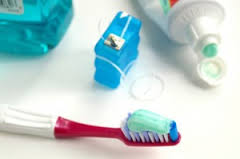5 Things You Didn’t Know About Your Teeth
Tips and Tricks to Help Your Overall Health
 Your teeth’s best friend might NOT be your toothbrush!
Your teeth’s best friend might NOT be your toothbrush!
Oh, sure, a toothbrush and a strand of floss wielded often and wisely will do wonders for your teeth. You should use both. But your teeth’s first line of defense against what you put in your mouth is something that’s already there. “Saliva is nature’s disinfecting cavity fighter,” Kimberly Harms, a dentist from Farmington, MN, says.
Snacking and sipping may be hurting your teeth.
Worse than a big old piece of chocolate cake after dinner or that mid-afternoon Snickers break is the non-stop snack-snack-snacking or sip-sip-sipping that goes on in offices and schools across America. So the more often you eat sugars and other carbs, the more often those acids get a chance to chip away at your choppers.
In short, it’s better (for your teeth, at least) to pig out once than to eat a lot of little meals.
Yes, you can get too much fluoride, but…
The naturally occurring mineral fluoride can help prevent tooth decay. That’s not disputed. How much fluoride is too much is the question. Because of ever-increasing sources, including naturally occurring; fluoride added to community water supplies; and what you get in mouthwashes, toothpastes, and elsewhere, the U.S. Department of Health and Human Services recommended in 2010 to limit the amount of fluoride in communities.
Toothpaste should be spit out, but not necessarily rinsed away.
Other than just being awfully gross, if you make a habit of swallowing toothpaste, you stand a chance of getting too much fluoride. As the tube says, don’t swallow.
Your teeth can be an indicator of your overall health.
One in 7 adults aged 35 to 44 has gum disease. For adults older than 65, that increases to 1 in every 4. That’s a problem, because tooth decay and other infections in the mouth may be associated with health problems such as heart disease, stroke, and diabetes.
